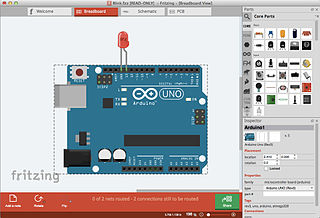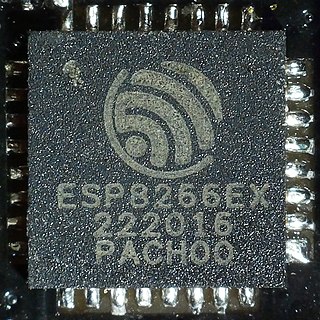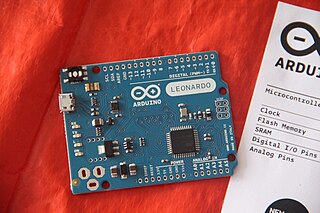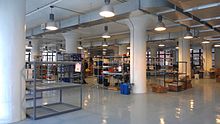
AVR is a family of microcontrollers developed since 1996 by Atmel, acquired by Microchip Technology in 2016. These are modified Harvard architecture 8-bit RISC single-chip microcontrollers. AVR was one of the first microcontroller families to use on-chip flash memory for program storage, as opposed to one-time programmable ROM, EPROM, or EEPROM used by other microcontrollers at the time.

Stripboard is the generic name for a widely used type of electronics prototyping material for circuit boards characterized by a pre-formed 0.1 inches (2.54 mm) regular (rectangular) grid of holes, with wide parallel strips of copper cladding running in one direction all the way across one side of on an insulating bonded paper board. It is commonly also known by the name of the original product Veroboard, which is a trademark, in the UK, of British company Vero Technologies Ltd and Canadian company Pixel Print Ltd. It was originated and developed in the early 1960s by the Electronics Department of Vero Precision Engineering Ltd (VPE). It was introduced as a general-purpose material for use in constructing electronic circuits - differing from purpose-designed printed circuit boards (PCBs) in that a variety of electronics circuits may be constructed using a standard wiring board.

Processing is a free graphical library and integrated development environment (IDE) built for the electronic arts, new media art, and visual design communities with the purpose of teaching non-programmers the fundamentals of computer programming in a visual context.
Atmel ARM-based processors are microcontrollers and microprocessors integrated circuits, by Microchip Technology, that are based on various 32-bit ARM processor cores, with in-house designed peripherals and tool support.

Arduino is an Italian open-source hardware and software company, project, and user community that designs and manufactures single-board microcontrollers and microcontroller kits for building digital devices. Its hardware products are licensed under a CC BY-SA license, while the software is licensed under the GNU Lesser General Public License (LGPL) or the GNU General Public License (GPL), permitting the manufacture of Arduino boards and software distribution by anyone. Arduino boards are available commercially from the official website or through authorized distributors.

SparkFun Electronics is an electronics retailer in Niwot, Colorado, United States. It manufactures and sells microcontroller development boards and breakout boards.

Fritzing is an open-source initiative to develop amateur or hobby CAD software for the design of electronics hardware, intended to allow designers and artists to build more permanent circuits from prototypes. It was developed at the University of Applied Sciences Potsdam. Fritzing is free software under the GPL 3.0 or later license, with the source code available on GitHub and the binaries at a monetary cost, which is allowed by the GPL.
OBDuino is an open source trip computer design based on the Arduino platform. An OBDuino may be assembled and customised by an electronics hobbyist; it displays information such as instantaneous fuel economy, engine tuning parameters etc. on an LCD.
ERIKA Enterprise is a real-time operating system (RTOS) kernel for embedded systems, which is OSEK/VDX certified. It is free and open source software released under a GNU General Public License (GPL). The RTOS also includes RT-Druid, an integrated development environment (IDE) based on Eclipse.

Limor Fried is an American electrical engineer and owner of the electronics hobbyist company Adafruit Industries. She is influential in the open-source hardware community, having participated in the first Open Source Hardware Summit and the drafting of the Open Source Hardware definition, and is known by her moniker ladyada, an homage to Lady Ada Lovelace.
Tinkerforge is an open source hardware platform of stackable microcontroller building blocks (Bricks) that can control different modules (Bricklets). The primary communication interface of the building blocks can be extended using Master Extensions. The hardware can be controlled by external programs written in C, C++, C#, Object Pascal, Java, Perl, PHP, Python, Ruby, Shell and VB.NET over a USB, Wifi or Ethernet connection, and running on Windows, Linux and macOS. This non-embedded programming approach eliminates the typical requirements and limitations of conventional embedded software development. Tinkerforge hardware and software are both Open Source, and all files are hosted on GitHub.

The ESP8266 is a low-cost Wi-Fi microchip, with built-in TCP/IP networking software, and microcontroller capability, produced by Espressif Systems in Shanghai, China.

The Proteus Design Suite is a proprietary software tool suite used primarily for electronic design automation. The software is used mainly by electronic design engineers and technicians to create schematics and electronic prints for manufacturing printed circuit boards.
MicroPython is a software implementation of a programming language largely compatible with Python 3, written in C, that is optimized to run on a microcontroller.

Comparison of Single-board microcontrollers excluding Single-board computers

CircuitPython is an open-source derivative of the MicroPython programming language targeted toward students and beginners. Development of CircuitPython is supported by Adafruit Industries. It is a software implementation of the Python 3 programming language, written in C. It has been ported to run on several modern microcontrollers.

Hack Club is a global nonprofit network of high school computer hackers, makers and coders founded in 2014 by Zach Latta. It now includes more than 400 high school clubs and 27,500 students. It has been featured on the TODAY Show, and profiled in the Wall Street Journal and many other publications.

RP2040 is a 32-bit dual ARM Cortex-M0+ microcontroller integrated circuit by Raspberry Pi Ltd. In January 2021, it was released as part of the Raspberry Pi Pico board.
















